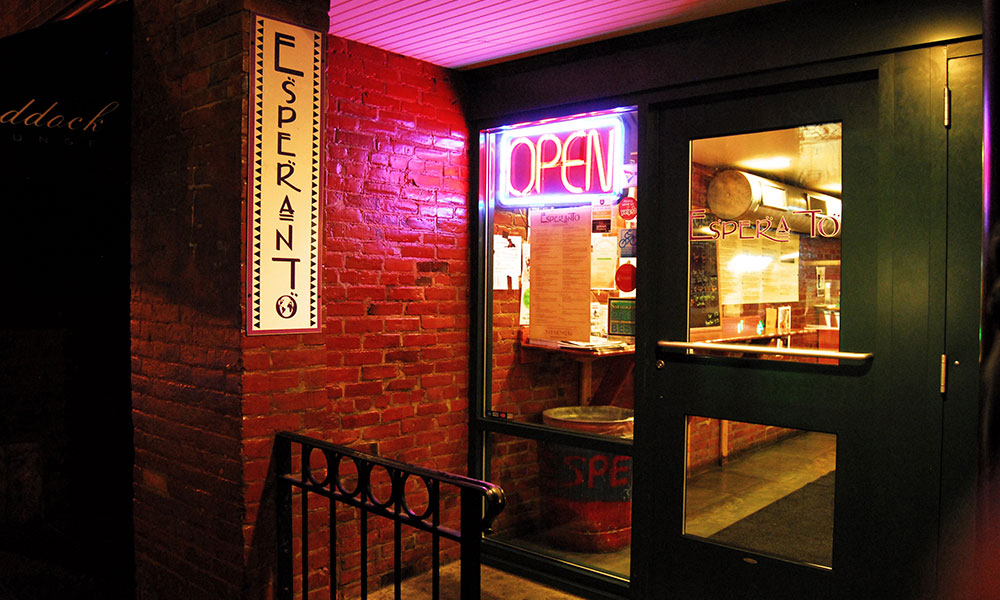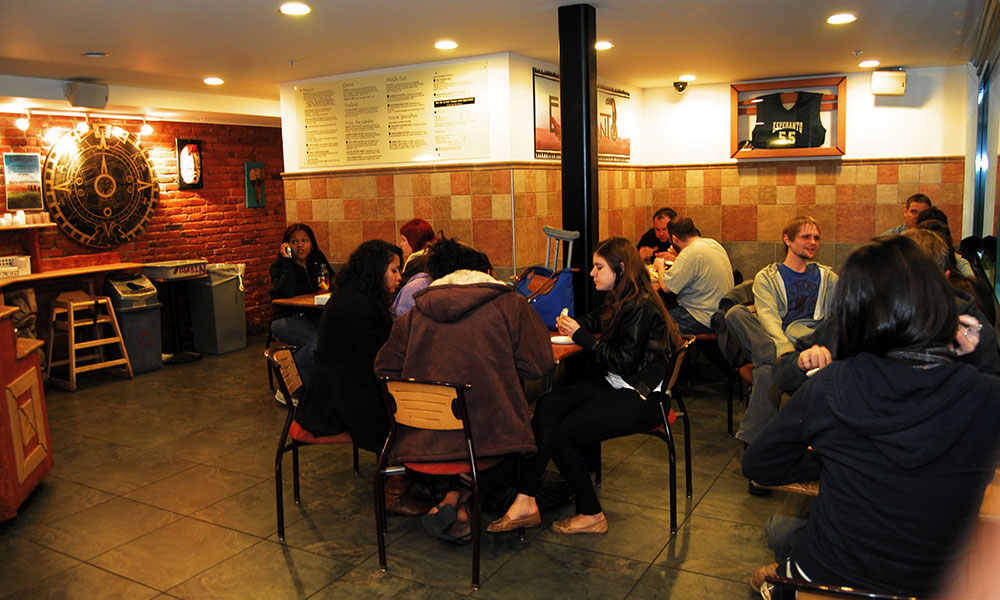Marsha and John Guarino’s three boys spent the tender years of their childhood in Saratoga Springs, scrounging spare dollars for after-school pilgrimages to Esperanto. Doughboys were their favorite item on the menu; they reveled in dunking the chicken-and-cheese-filled tubes of pizza crust in Frank’s RedHot. When the family moved to Los Angeles, the Guarino boys were forced to say goodbye to their favorite Saratoga snack – until one evening, months later, when they sat down for dinner in Thousand Oaks and Marsha brought out a pile of piping-hot doughboys on a dinner platter. She had returned to New York to visit family and stopped at Esperanto before flying out of Albany; she flew the whole way home to LA with a box of doughboys on her lap.
The Guarinos are enthusiastic members of the ever-growing doughboy fanbase. We’ve all seen that brightly-colored poster on the back wall of Esperanto: “We’ve sold over one million Doughboys!” According to Will Pouch, co-owner and -founder of Esperanto, they’ve actually sold more than two million. “I used to wonder, ‘Why do people go nuts over it?'” he says. “It used to perplex me…I don’t know. It’s a funny thing.”
Esperanto has been peddling everything from burritos to samosas to twice-baked-potatoes since the mid-90s, when Pouch and his wife, Belinda, teamed up with Skidmore College Professor Sheldon Solomon and his wife, Maureen, to fill a gap in Saratoga’s culinary market. “We were dying for a good burrito joint,” Will remembers. But their future held more than burritos. An entirely different street food discovery was on the horizon: the doughboy, a burrito-shaped, pizza-crust-encompassed wrap filled with a secret mixture of spices, cheese and chicken breast. And destiny.
Solomon and Pouch met in college, during Solomon’s first year of professorship at Skidmore. Solomon was only 26 at the time, and Pouch was one of his students. “We got to be friends because he was a young professor and when Belinda and I would come back to town for SPAC shows, we’d crash on Sheldon and Maureen’s floor,” Pouch says. When the Pouches moved back to Saratoga, their friendship with the Solomons prompted restaurant aspirations. Together, the two couples comprised a team with everything they needed to start their own eatery: The Solomons both had restaurant experience, and Sheldon had even done some cooking. Will was well-versed in sales and purchasing, and Belinda was a licensed lawyer with a background in accounting.

Pouch and Solomon invented the doughboy just two weeks after Esperanto’s grand opening. They were trying to think of a new special. “Sheldon used to make this chicken and cheese thing when he was in college and didn’t have anything else to cook with,” Will tells me. Solomon, now an internationally recognized professor of psychology and a co-author of The Worm at the Core: On the Role of Death in Life, describes the old recipe as “a product of inebriated necessity” that dated back to the 1970s, when he was attending grad school in Lawrence, Kansas. “They were wrapped in bread originally…we, being like guys in a Beavis and Butthead existence, used to call them dough turds.”
Pouch used pizza dough to fold up Solomon’s college concoction and threw everything in the oven. Then they loaded the first six doughboys into a pizza box and brought them next door to Desperate Annie’s bar in search of guinea pigs. “Before long we were selling hundreds,” remembers Pouch. They quickly put an end to their $1 Doughboy Special; it would have put Esperanto out of business.
“By the late 90s, we sold probably 40,000 to 50,000 doughboys a year,” says Pouch. In the early 2000s, that number rose to somewhere between 80,000 and 90,000. In more recent years, doughboys have been sold as concessions across the Capitol Region—at SPAC, Skidmore, Brewfest, and other events—pushing that number up to 125,000, for an average of 342 doughboys sold every day of the year. “I’ve been compared to Walt Disney,” laughs Pouch. “When I’m pitching the product, it’s like I’m just letting the magic happen.”

That powerful doughboy magic is making its way across state lines. “We were playing a show… honestly I couldn’t tell you what city or what venue…I just remember being in Michigan,” says Bobby Carlton of the Saratoga-based rock band, Dryer. “When we announced that we were from Saratoga Springs, NY, some guy yelled out, ‘I love doughboys!’ I do remember asking him how many he could eat, to which he loudly responded, ‘Five!'” Solomon has also been confronted by doughboy fans during out-of-state trips. “I was invited to talk at Harvard two or three years ago,” he tells me. According to Solomon, the professors mentioned that he had invented the doughboy while they were introducing him to the crowd, and they even joked that it was the only reason they invited him. “I thought it was kind of neat,” Solomon says. “The students knew what they were talking about.”
Annually, Skidmore hosts the American Culinary Foundation-sanctioned Culinary Conference Competition, during which teams of chefs from around the country are given identical baskets of ingredients and compete to create the best four-course menu and buffet platter. On multiple occasions, Esperanto has been commissioned to provide doughboys to the chefs during breaks. “So you have all these chefs standing around eating doughboys, making comments,” Pouch says. “Good balance,” one told him. “A good finish,” said another. “Hardy, but creamy.”

Of course, within the state of New York, the doughboy’s dominance is unquestionable. State troopers have been known to pass through Saratoga solely to drop by Esperanto, usually with hefty doughboy orders. One trooper picks up a box of doughboys, then reports to Utica, where the box is picked up by another on the way to Syracuse. “They’d get out to Buffalo,” Pouch tells me. While doughboy-mania may spread like wildfire, Esperanto’s capacity to meet demand has always been limited by its tiny, four-person kitchen. In the late 90s, Esperanto was forced to turn down what would have been a game-changing deal with the Bronx Zoo, which wanted thousands of doughboys for their concession stand. According to Solomon, production capacity has been an issue ever since doughboys were invented: “We were shocked by the immediate success of them. On the weekends we couldn’t make them fast enough; there would be near riots towards the end of the night.” Adds Pouch: “People used to get in fist fights over doughboys in the early years.”
The Esperanto kitchen is now stocked with industrial cooking equipment and a staff well-versed in high-output doughboy production. “We have a good, tight-knit crew that has been with us for years,” Will tells me. “My crew is really impressive; just some really seasoned former commercial bakery owners and consultants.”
But it’s still not enough to meet Esperanto’s ever-expanding demand. “We’re at a tipping point,” says Will. Last October, Stewart’s began selling doughboys in 13 of its stores. They’re selling well. Now Jiffy Mart also carries doughboys, wholesale. With doughboys flying off the shelves at several locations around the region, Esperanto is considering new means of production. “We are on the cusp of identifying a space to be the doughboy factory,” says Will. But don’t worry, Saratoga’s homegrown pizza tubes won’t be rolling out on a conveyor belt anytime soon. Will says the doughboys will still be handmade, and that the facility will be more of a “high-output doughboy bakery.”

In preparation for mass production, the doughboy may also undergo some rebranding. “If you look in survey or focus situations, when you say ‘doughboy,’ the top result is an American World War I soldier or the Pillsbury Doughboy,” Pouch says. “Doughboy” is also a common name for fried dough covered in powdered sugar, a high-calorie treat that’s often sold at county fairs. Esperanto’s locally famous snack name threatens to confuse future clients, but it may also be a challenge to find a new name that won’t turn off the doughboy’s original fanbase. Pouch says that Esperanto has considered changing the doughboy’s name for some time and even tried holding a re-naming contest in the 90s. “People weren’t having it,” he remembers. “Right now regionally, if you ask people in this area what a doughboy is, they’re going to say that it’s that thing on Caroline Street.”
Even with a new name, new factory, and new admirers, it seems unlikely that the doughboy, or whatever it will be called, will ever lose its hold on the hearts of Saratoga locals. Solomon’s involvement in Esperanto has waned over the years, so most of his students aren’t aware that he has any part in the history of the doughboy; that means he can keep tabs on their honest restaurant preferences. “When I’m at Skidmore teaching, I’ll say to my class, ‘Let’s have snacks…What do you want?’ Mostly they say, ‘Esperanto,'” he tells me. “It’s kind of awesome.” And kind of amazing, considering it all started with the recipe for the “dough turd.”



